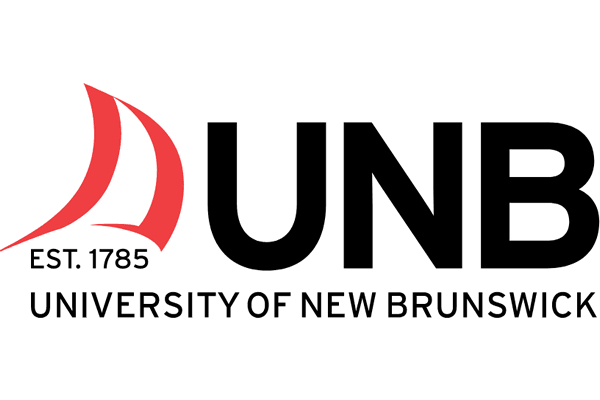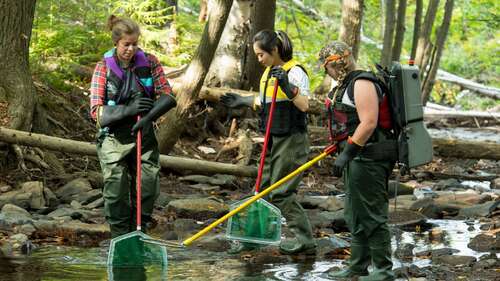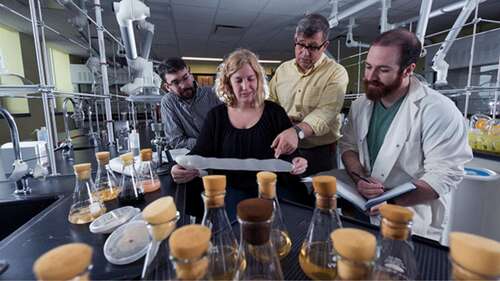Discover revolutionary programs that make UNB a leader in post-secondary education

In today’s competitive job market, Canadian students are increasingly on the lookout for post-secondary programs that not only align with their passions but also provide a clear advantage for success after graduation. It’s essential to choose programs that not only reflect current interests but also embrace innovation with up-to-date curricula.
Nestled within the captivating landscapes of Fredericton and Saint John, University of New Brunswick (UNB) is one of Canada’s most esteemed and oldest English-language universities. Since 1785, the multi-campus institution has taken pride in its core belief that students require programs that continually evolve to thrive in an ever-changing world. The university achieves this by offering more than 100 programs that are not only regularly updated but also designed to shape students into impactful industry leaders–interdisciplinary studies, criminal justice and chemical engineering to name a few. From kinesiology and forestry and environmental management to health, read on to learn more about UNB’s commitment to innovation and cutting-edge education.
UNB’s Faculty of Kinesiology is a true hub for innovation thanks to its state-of-the-art facilities, dynamic programs and unique partnerships. By offering a blend of science, recreation and sports programs (including a one-of-a-kind MBA in Sports and Recreation Management with a 96 per cent placement rate), the faculty focuses on developing well-rounded individuals, not just students.
Program partnerships with leading organizations such as The Stan Cassidy Centre for Rehabilitation and the Institute of Biomedical Engineering allow students to gain firsthand experience in real-world applications of their studies, making them especially hirable post-graduation. The faculty’s research also focuses on biosciences; psychological, socio-cultural, managerial, and philosophical aspects of human performance; as well as recreation and sport. They’re currently making waves with their research on musculoskeletal health, human performance and movement, as well as diversity and social inclusion in and through sport while leveraging virtual reality (VR).
Beyond academics and research, the faculty is also committed to nurturing its students holistically. Peer mentorship, travel-study programs (including a one-year program in the West Indies) and competitive internships are all integral components to empowering students and fostering the skills and confidence essential for landing their dream jobs—whether that’s working as a VR rehabilitation specialist, an executive director of a sport organization or a trainer at the Olympics.

Photo provided by the University of New Brunswick
The Faculty of Forestry and Environmental Management (ForEM)at UNB is at the forefront of tackling the management of natural resources (e.g. trees, water, and wildlife) through the broad lens of climate change through a diverse range of programs. With a commitment to finding innovative solutions, two undergraduate and seven graduate programs are designed to address the pressing environmental issues of today and pave the way for a sustainable future. This interdisciplinary program blends social, natural, and management sciences, along with opportunities for experiential learning, entrepreneurship and collaboration. Notably, it focuses on fostering small class sizes to ensure a supportive learning environment where faculty members and students can spend time outdoors, with forests and streams just a short distance from campus, enhancing their hands-on learning experience.
In terms of innovation, the faculty develops and uses advanced technology and tools for natural resources. This includes GIS (geographic information systems) tools for spatial management and analysis; Remsoft, a leading forest management software used on over 500 million acres in 15 countries across 6 continents; and Green Analytics, a software in Canada for tracking energy use and greenhouse gasses. They’ve also created award-winning tools like Dr. Paul Arp’s mapping tool for wet areas, widely used in Canada to help identify wet areas, protect water bodies, and infrastructure, and improve the efficiency of harvesting operations. The interdisciplinary research from within ForEM produces more than 50 peer-reviewed scientific publications per year.
UNB students are sought after for summer jobs and careers in areas like Watershed Manager, Water/Environmental Consultant, GIS Spatial Analyst, Land and Water Use Manager, Water Resource Regulator, Sustainability Officer and many more.

Photo provided by the University of New Brunswick
UNB’s Bachelor of Health program–a unique offering in Eastern Canada–champions an interdisciplinary curriculum blending arts, business, and science. In majors like Society and Health, students explore social, political and economic topics through courses in history, politics, sociology and psychology, addressing critical issues like homelessness and mental health.
Management in Health majors focus on efficient health care systems administration, covering fundamental business topics and advanced courses in healthcare system improvement, epidemiology, and health economics.
Biomedical Science and Health majors focus on the basic biological processes that underlie disease. After completing foundational courses in biology, chemistry, and psychology, students take courses, such as epidemiology, the biology of cancer, cardiovascular health and disease, and clinical neuroscience. Although many pursue professional programs like medical school or dentistry, students are well prepared for entry level careers in biomedical science laboratories and businesses.
Experiential education is key at UNB, allowing students to contribute to health innovation and engage in interdisciplinary health-focused community experience and research. Graduates emerge as innovative thinkers, excelling as health care administrators, policy makers, medical professionals and research scientists, poised to navigate the complex landscape of global health challenges.
Click here to learn more about UNB’s post-secondary education offerings.



